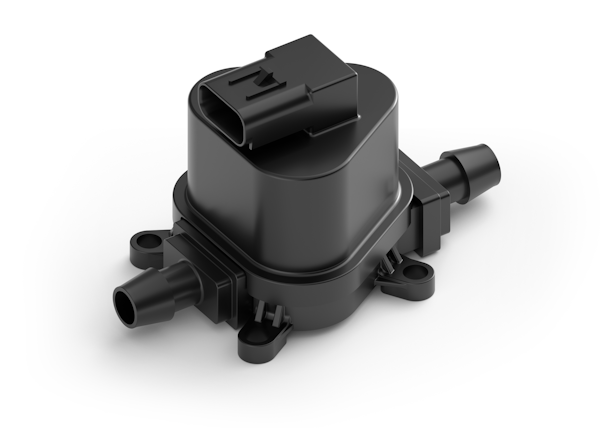The Ideal Fluid Control Valve for EV Thermal Management

The increasing demand for EVs are driving design teams to search out innovative fluid management solutions for EV thermal management applications. Unlike internal combustion engines, which have relatively simple cooling systems, EV cooling systems must be able to manage multiple heat sources and sinks, each with specific optimal operating temperatures and flow rates.
The ideal proportional control valve for EV thermal management applications would be a valve that did not require steady-state power to hold a commanded position, would be capable of a true leak-free off state, would have a predictable and repeatable relationship between setting and flow (zero hysteresis), and would include a fail-safe condition when power is lost. Traditional proportional control valves do not share all these attributes. For example, stepper-driven rotary valves are a common extant solution and can achieve near-zero hysteresis and near-zero flow state, but they lack the capacity for a fail-safe mode. Additionally, the stepper motor and controller may add weight and cost to the system, and the rotating shaft seals are prone to leakage, inhibiting consistent performance. A better solution is desirable.
The discrete proportional valve system (DPV) is an innovative alternative that incorporates all the desirable attributes with none of the deficiencies of extant solutions. The DPV relies on a combination of binary (on-off) valves of differing flow coefficients housed in a single manifold to achieve a stepped approximation of linear response. The desired flow rate is achieved by opening and closing the valves in specific combinations.

In a traditional proportional valve, there is always some hysteresis induced by mechanical friction and magnetics. The DPV, by definition, achieves zero hysteresis because any given commanded flow state always results in the same valve members opening and/or closing in the same combination, resulting in the same repeatable flow coefficient. The resulting stepped approximation of linear response is a trade-off, but it allows the DPV to provide all the other desirable benefits. By incorporating latching solenoid design into the valve actuator, the DPV does not require steady-state power to hold a commanded state. With the latching design, only a short pulse of power is required to actuate the solenoid into the latched position. Permanent magnets hold the solenoid in the latched position without constant power, and a short pulse of power of opposite polarity is used to release the solenoid. The result of this technology is a valve system that maintains a commanded flow condition with zero power input.
A true zero-flow state is native to the DPV. Other forms of proportional control do not achieve a true zero-flow state and require very tight tolerances, resulting in increased cost and sensitivity to debris and wear. With the DPV design, debris tolerance can be tailored to the requirements of the application, and the solenoid actuator can be isolated from the fluid flow, limiting ingress of debris into the actuator.
Finally, the DPV’s control system easily accommodates fail-safe capability. The control system can be programmed to actuate the valve system to any specified safe condition upon power loss. A capacitor incorporated into the control circuit board provides the pulse of power needed to actuate the valve to the specified safe condition.
Because of the unique flow characteristics of DPV, design teams need to determine how the stepped flow rates are best configured for their system. Some critical considerations are determining how many flow stages are needed, how the flow rates should increase, and if the application requires an initial low-flow stage or a true zero-flow condition.

In once recent example, a design team working on the specifications for a thermal management system first determined that precision fluid control was not needed. They specified a valve system with only two DPV orifices with just four flow rates to save size, weight, and cost. Next, they confirmed that the valve’s initial position needed to be zero flow instead of low flow with a balanced increase in flow rate. With those specifications in mind, they determined the power requirements. Taking all these factors into account, the team was able to map out the best DPV unit for the project.
In another application, the design team determined they needed a system that would more closely resemble traditional proportional flow. They chose a DPV system with three latching solenoids (and related orifices) to provide eight valve positions. This configuration created a larger valve, but it still allowed the design team to make important adjustments related to orifice size and flow rates.

It is important to note that stepped flow rates will not replace traditional proportional technologies in every application. If precise linear control is not needed, the benefits of DPV will pay valuable dividends to the final system or product. Energy efficiency is a key consideration for many design teams, and if it is of particular importance, DPV should be evaluated. The chart below is a power consumption comparison between a traditional proportional valve and a DPV solution.
These energy savings are achievable because traditional proportional valves need power both to actuate and to hold a commanded position. A DPV only requires a short pulse of power to change state, and the commanded flow rate is maintained without steady-state power.
Discrete proportional valve solutions are ideally suited for fluid control in EV thermal management applications. They are energy efficient, have zero hysteresis, a true leak-free off state, and are capable of fail-safe operation. Additionally, the technology allows for customizations in flow rates and the number of flow positions to ensure the performance of each valve is matched to the system’s requirements.
This article was originally published by Charged Electric Vehicles in December 2021
Want to explore design examples?
TLX Technologies is the go-to custom solenoid partner of the world’s top brands, first-tier suppliers, and OEMs